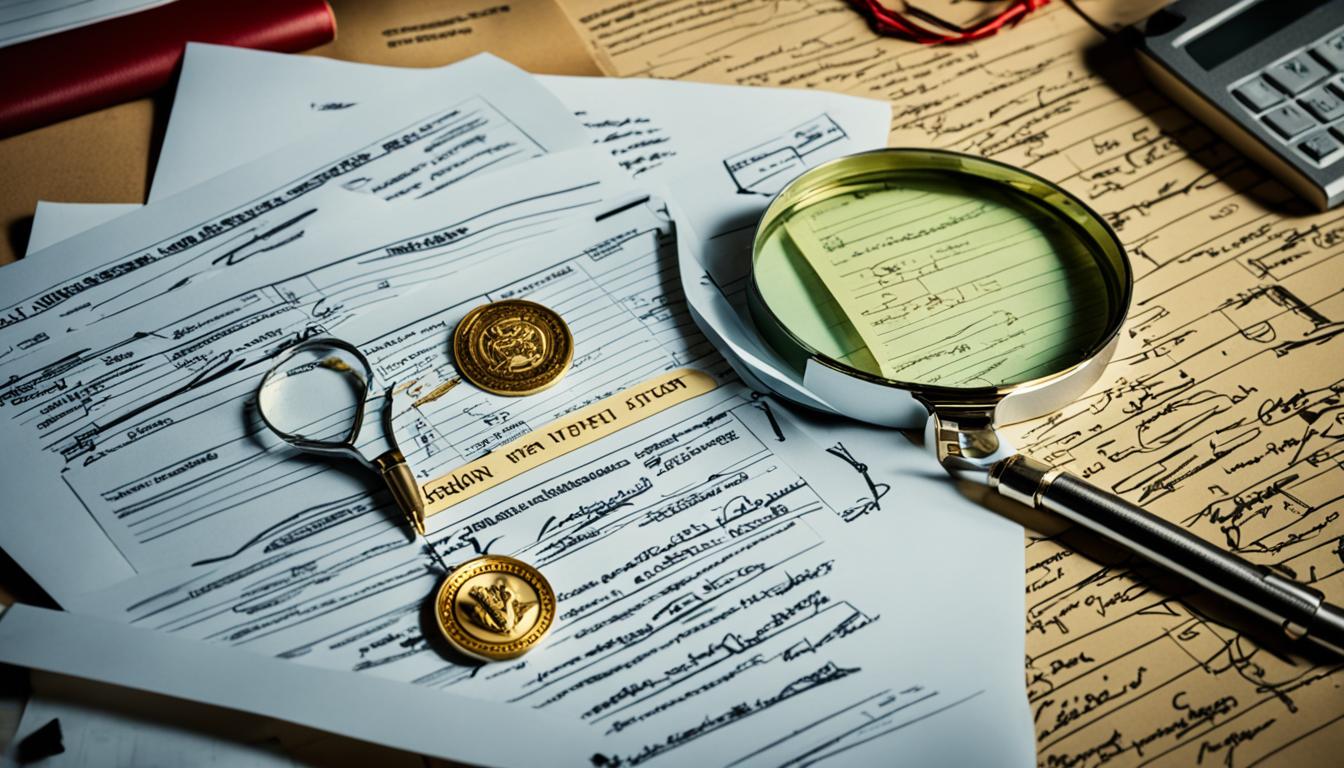Becoming a Detective: Timeline Explained
Did you know that becoming a detective requires an average of 5 to 8 years of education and experience? The path to becoming a detective is not as quick as you might imagine, but the journey is undoubtedly rewarding. Let’s dive into the timeline and intricacies of a detective’s career to gain a better understanding of what it takes to become a skilled investigator.
Key Takeaways:
- It takes around 5 to 8 years of education and experience to become a detective
- Specializations in areas such as homicide, computer forensics, or corporate malpractice are possible
- A high school diploma or GED is usually the minimum requirement, but further education is highly beneficial
- Experience as a police officer is necessary before being eligible for promotion to the detective rank
- Salary varies depending on location and experience, with median annual wages between $52,120 and $86,280
Detective Education and Requirements
When it comes to pursuing a career as a detective, certain education and requirements need to be met. While a high school diploma or GED is typically the minimum educational requirement, many aspiring detectives choose to further their qualifications through higher education. This includes obtaining an associate’s or bachelor’s degree in fields such as criminal justice, psychology, criminology, or related disciplines.
In addition to formal education, aspiring detectives may be required to pass physical exams and background checks. Attending a police academy for further training is often a necessary step in preparation for a detective role. These academies provide comprehensive instruction in investigative techniques, communication skills, and legal procedures.
After completing the necessary education and training, prospective detectives must gain practical experience as police officers. This experience is essential for developing the skills and knowledge needed to succeed in a detective position. The duration of experience required may vary, but it typically takes several years of service in law enforcement before individuals become eligible for promotion to the detective rank.

Obtaining the required education, passing physical exams and background checks, and gaining experience as a police officer are crucial steps on the path to becoming a detective. These steps set the foundation for a successful career in the field of criminal investigation. By fulfilling these requirements, individuals gain the necessary skills and qualifications to navigate the complexities of detective work and play a vital role in solving crimes.
| Requirements | Educational Qualifications | Additional Exams | Experience |
|---|---|---|---|
| Minimum Requirement | High school diploma or GED | Physical exams, background checks | Several years of police officer experience |
| Enhanced Qualifications | Associate’s or bachelor’s degree in criminal justice, psychology, criminology, or related fields | – | – |
Detective Salary and Job Prospects
When considering a career as a detective, understanding the salary prospects and job opportunities is crucial. The salary of detectives can vary depending on factors such as location and experience.
According to the Bureau of Labor Statistics, private detectives earn a median annual wage of $52,120, while police detectives earn a median annual wage of $86,280. These figures reflect the average earnings nationwide.

It’s important to note that the salary can differ significantly based on the region. The top-paying states for detectives are the District of Columbia, Alaska, Hawaii, Maryland, and Washington. Detectives in these areas have the potential to earn higher wages due to cost of living and demand for their expertise.
When it comes to job prospects, the field of detective work is expected to experience a steady growth rate of 5% for all occupations. This projection indicates consistent demand for detectives in various sectors.
To maximize job prospects and increase earning potential, thorough preparation and meeting the necessary requirements are essential. Aspiring detectives should obtain the required education in criminal justice or a related field and gain experience as a police officer. This combination of education and experience will position individuals for success in their detective careers.
| Occupation | Median Annual Wage |
|---|---|
| Private Detectives | $52,120 |
| Police Detectives | $86,280 |
Skills and Specializations of Detectives
Being a successful detective requires a diverse range of skills and the ability to specialize in different areas of investigation. These skills enable detectives to effectively gather and analyze evidence, interview witnesses, and provide valuable insights into solving crimes.
One of the essential skills for detectives is effective communication. They need to be able to build rapport with witnesses and suspects, as well as clearly convey their findings and observations to other team members and law enforcement agencies.
Critical thinking and decision-making are crucial skills that detectives rely on to solve complex cases. They need to analyze evidence, identify patterns, and make sound judgments based on their investigative instincts and knowledge.
Detectives also need to have a natural curiosity and inquisitiveness. They must possess a keen eye for detail, always asking the right questions and seeking answers that may lead to crucial breakthroughs in a case.
Patience is another important quality for detectives, as investigations can often be long and drawn-out. They need the perseverance and determination to meticulously sift through evidence, follow leads, and stay focused until the truth is uncovered.
Resourcefulness is a trait that detectives must possess to adapt to various situations and overcome obstacles that may arise during an investigation. They need to think creatively and outside the box to find innovative solutions to complex cases.
In addition to these essential skills, detectives can specialize in different areas of investigation. Here are some common specializations:
- Homicide: Detectives specializing in homicide investigations focus on solving cases involving murder. They meticulously gather evidence, interview witnesses and suspects, and work closely with forensic experts to build a solid case.
- Forensics: Forensic detectives specialize in analyzing physical evidence such as fingerprints, DNA, and ballistics. They use advanced scientific techniques and tools to uncover crucial evidence that can link suspects to the crime scene.
- Juvenile Cases: Detectives specializing in juvenile cases work primarily on crimes involving minors. They need to have a deep understanding of child psychology and employ specialized interviewing techniques to gather reliable information.
- Gangs and Narcotics: Detectives in this specialization focus on investigating organized crime groups involved in drug trafficking, gang-related violence, and other criminal activities. They work closely with undercover officers, informants, and surveillance teams to gather evidence on criminal organizations.
- Commercial Crimes: These detectives investigate crimes related to fraud, embezzlement, and other financial offenses. They analyze financial documents, interview employees, and work closely with forensic accountants to uncover fraudulent activities.
- Cybercrime: With the increasing prevalence of digital crimes, detectives specializing in cybercrime investigate offenses such as hacking, online fraud, and identity theft. They possess advanced knowledge of digital forensics and stay up to date with emerging cyber threats.
Continuous training and staying updated with advancements in technology are crucial for detectives to excel in their respective specializations. By honing their skills and staying specialized, detectives can contribute significantly to the criminal justice system and bring justice to victims and their families.
Becoming a Detective: Step by Step
If you have always dreamed of pursuing a career in detective work, it’s important to understand the steps involved in reaching that goal. Here is a step-by-step guide outlining the path to becoming a detective:
1. Obtain a high school diploma or GED: A solid educational foundation is essential. Start by obtaining a high school diploma or a General Educational Development (GED) certificate.
2. Pursue higher education in criminal justice or a related field: While a high school diploma may be the minimum requirement, earning a degree in criminal justice or a related field can significantly enhance your chances of becoming a detective.
3. Complete police academy training and become a police officer: Joining a police department and completing the required training at a police academy is the next step. This training will equip you with the necessary knowledge and skills to work as a law enforcement officer.
4. Gain several years of experience as a police officer: Building a solid foundation of experience as a police officer is crucial. It allows you to develop investigative skills, learn about the criminal justice system, and understand the complexities of law enforcement.
5. Pass the National Detective/Investigator Test: Many jurisdictions require aspiring detectives to pass a national detective or investigator test. This test evaluates your knowledge and aptitude in investigative techniques and procedures.
6. Transition into a detective position: After meeting the necessary requirements and gaining the required experience, you can finally transition into a detective position. This is when you can begin solving complex cases and focusing on specialized areas of investigation.
While the timeline to become a detective can vary depending on individual circumstances, it typically takes around 2 to 6 years of education and experience to reach this career milestone. Remember, patience, dedication, and a passion for justice are key factors in embarking on this rewarding journey.
- Canada Arrest Protocol: What Police Say Upon Arrest - June 12, 2025
- Can Police Disclose Who Reported You? Find Out Here - June 6, 2025
- 2025 Window Rebates Ontario: How to Save Money While Replacing Windows and Doors - April 24, 2025




















Post Comment